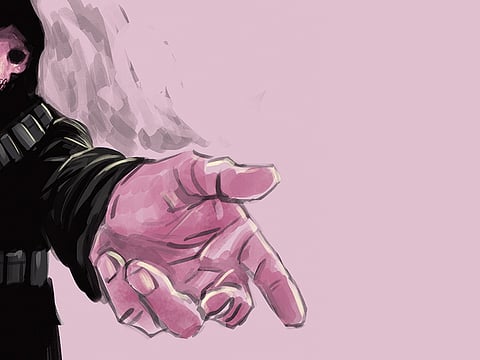Of Daesh, violence and human beings
It requires no PhD dissertation to discern where the appeal that Daesh holds for young Muslims is anchored: In a nostalgia for the absolutes of a bygone era

Let us take a fresh look at the folks from Daesh (the self-proclaimed Islamic State of Iraq and the Levant): We cannot beat them — not for now — and we clearly do not want to join them. So let us at least explain them.
Let us explain this phenomenon that has descended on us as if out of nowhere — this ferocious group that, leaving by the wayside the civilising role of moral values in our lives, has beheaded journalists, executed prisoners, enslaved minorities and demolished precious antiquities.
Yet, Daesh has thrived and drawn into its orbit not, as you would have expected, psychopaths but sundry educated youngsters from places as disparate as Chechnya and Canada, all hell-bent, as two 24-year-old Muslims from Anaheim, California, appear to have been — who were arrested last week as they were about to board a plane in Los Angeles Airport on their way to join the group — to “die on the battlefield”.
How do we then explain this phenomenon? Modesty aside, with impressive ease.
It requires no PhD dissertation to discern where the appeal that Daesh holds for young Muslims is anchored: In a nostalgia for the absolutes of a bygone era where Muslims inhabited a world that was more muscular, more self-confident, more responsive to the energies of their sense of self than their own, where they are daily taunted, as it were, by the accusing ideal of the past.
They yearn, in short, for the “assabiyah” that Ibn Khaldun, in his iconic work, Muqadamah, claimed to have embodied the cultural zest, social elan and laid-back pride of the Islamic Commonwealth of Nations. There, this nostalgic imagining has it, the centre held. Young Muslims in the West today have, other than their sense of otherness, nothing but the tawdry flatness of prosperity to deal with. And their counterparts in the Arab world, who have seen the collapse of their revolutionary hopes by the third quarter of the 20th century, inhabit a world made inert by defeat — defeat even at the hands of an upstart settler colonial entity grafted on the heartland of that world — where they are left with a reservoir of turbulent, unused energies.
A whole generation of young Muslims, in a sense, was menacingly overripe for a response to the first battle cry, the first call to “stiffen the sinews, summon up the blood”, and to give vent to those thwarted energies for which their societies allowed no scope.
Enter Daesh: And its appeal to the death wish, a wish operative in individuals as well as, collectively, in societies. Driven by unfulfilled human instincts, as Sigmund Freud suggested in Civilisation and its Discontents, men become propelled by an inescapable drive towards war, towards a supreme assertion of identity at the cost of self-destruction.
Let us not underestimate, or be skittish about discussing, the liberating role that combat has played in human history, human culture and human striving. In the very act of warring, whether hunting animals or killing members of our own species, our brain (as we are reminded by Karen Armstrong in her new book, Fields of Blood) is awash with serotonin, the neurotransmitter responsible for the sensation of ecstasy that we associate with forms of spiritual experience.
And I quote, at length, from Chris Hedges’s provocative, but cogently argued, book, War Is a Force that Gives Us Meaning (2002): “War makes the world understandable, a black-and-white tableau of them and us. It suspends thought, especially self-critical thought. All bow before the supreme effort. We are one. Most of us willingly accept war as long as we can fold it into a belief system that paints the ensuing suffering as necessary for a higher good, for human beings seek not only happiness but meaning. And tragically, war is sometimes the most powerful way in human society to achieve meaning”.
In short, to escape their drab existence in the Midwest and their deprived lives in the Mideast, Daesh offers its followers the assertive machismo of the reptilian side of our brain and a promise to restore these followers’ personal existence to a full pitch of reality.
When we kill, we kill not only as Muslims from Daesh, but as Christian Crusaders in Jerusalem, and as Jews imbued with the blood-lust of the Old Testament.
Consider what the historian Raymond Aguilers observed, and revelled in writing about, after the Crusaders stormed Jerusalem in July, 1099: “Piles of heads, hands and feet were to be seen. It was necessary to pick one’s way over the bodies of men and horses. Men rode in blood up to their knees and bridle reins. Indeed it was a just and splendid judgement of God that this place should be filled with the blood of unbelievers, since it had long suffered from their blasphemies”.
And in the Old Testament, Samuel I 15:3, we read of God’s putative command to his Chosen People: “Now go, attack the Amelekites and totally destroy all that belongs to them. Do not spare them, put to death men and women, children and infants, cattle and sheep, camels and donkeys”. And the “blood-dimmed tide”, as Yates called the mayhem of the First World War, where Europeans lunged at each other, killing millions of their fellow Europeans, was no picnic either.
These folks cannot hold the candle to Daesh, for we are all brothers under the skin.
Fawaz Turki is a journalist, lecturer and author based in Washington. He is the author of The Disinherited: Journal of a Palestinian Exile.


